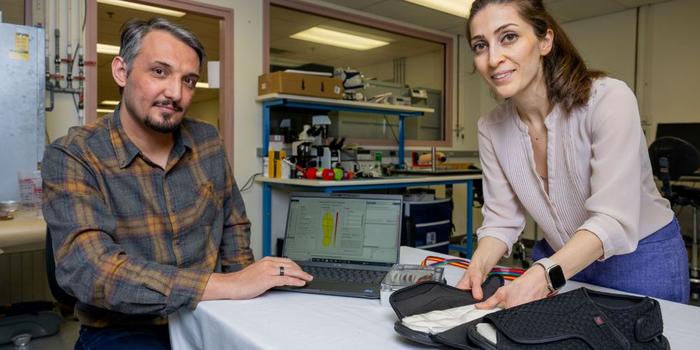Researchers have developed a new shoe insole technology that helps reduce the risk of diabetic foot ulcers, a dangerous open sore that can lead to hospitalization and leg, foot or toe amputations.

Credit: Photo courtesy UT Arlington
Researchers have developed a new shoe insole technology that helps reduce the risk of diabetic foot ulcers, a dangerous open sore that can lead to hospitalization and leg, foot or toe amputations.
“The goal of this innovative insole technology is to mitigate the risk of diabetic foot ulcers by addressing one of their most significant causes: skin and soft tissue breakdown due to repetitive stress on the foot during walking,” said Muthu B.J. Wijesundara, principal research scientist at The University of Texas at Arlington Research Institute (UTARI).
Affecting about 39 million people in the U.S., diabetes can damage the small blood vessels that supply blood to the nerves, leading to poor circulation and foot sores, also called ulcers. About one-third of people with diabetes develop foot ulcers during their lifetime. In the U.S., more than 160,000 lower extremity amputations are performed annually due to complications from diabetic foot ulcers, costing the American health system about $30 billion a year. Those who have foot ulcers often die at younger ages than those without ulcers.
“Although many shoe insoles have been created over the years to try to alleviate the problem of foot ulcers, studies have shown that their success in preventing them is marginal,” Wijesundara said. “We took the research a step further by creating a pressure-alternating shoe insole that works by cyclically relieving pressure from different areas of the foot, thereby providing periods of rest to the soft tissues and improving blood flow. This approach aims to maintain the health of the skin and tissues, thereby reducing the risk of diabetic foot ulcers.”
In an article in the peer-reviewed International Journal of Lower Extremity Wounds, Wijesundara and UTA colleagues Veysel Erel, Aida Nasirian and Yixin Gu, along with Larry Lavery of UT Southwestern Medical Center, described their innovative insole technology. After this successful pilot project, the next step for the research team will be refining the technology to make it more accessible for users with varying weights and shoe sizes.
“Considering the impact of foot ulcers, it’s exciting that we may be able to make a real difference in the lives of so many people,” Wijesundara said.
***
This work was supported by a $229,480 grant from the National Institute of Aging of the National Institutes of Health, grant number 7R21AG061471.
Journal
The International Journal of Lower Extremity Wounds
Method of Research
Experimental study
Subject of Research
People
Article Title
Development of Cyclic Pressure Offloading Insole for Diabetic Foot Ulcer Prevention
Article Publication Date
29-Feb-2024
COI Statement
The author(s) declared no potential conflicts of interest with respect to the research, authorship, and/or publication of this article. The author(s) disclosed receipt of the following financial support for the research, authorship, and/or publication of this article: This work was supported by the National Institute of Aging of the National Institute of Health, (grant number 7R21AG06147).



